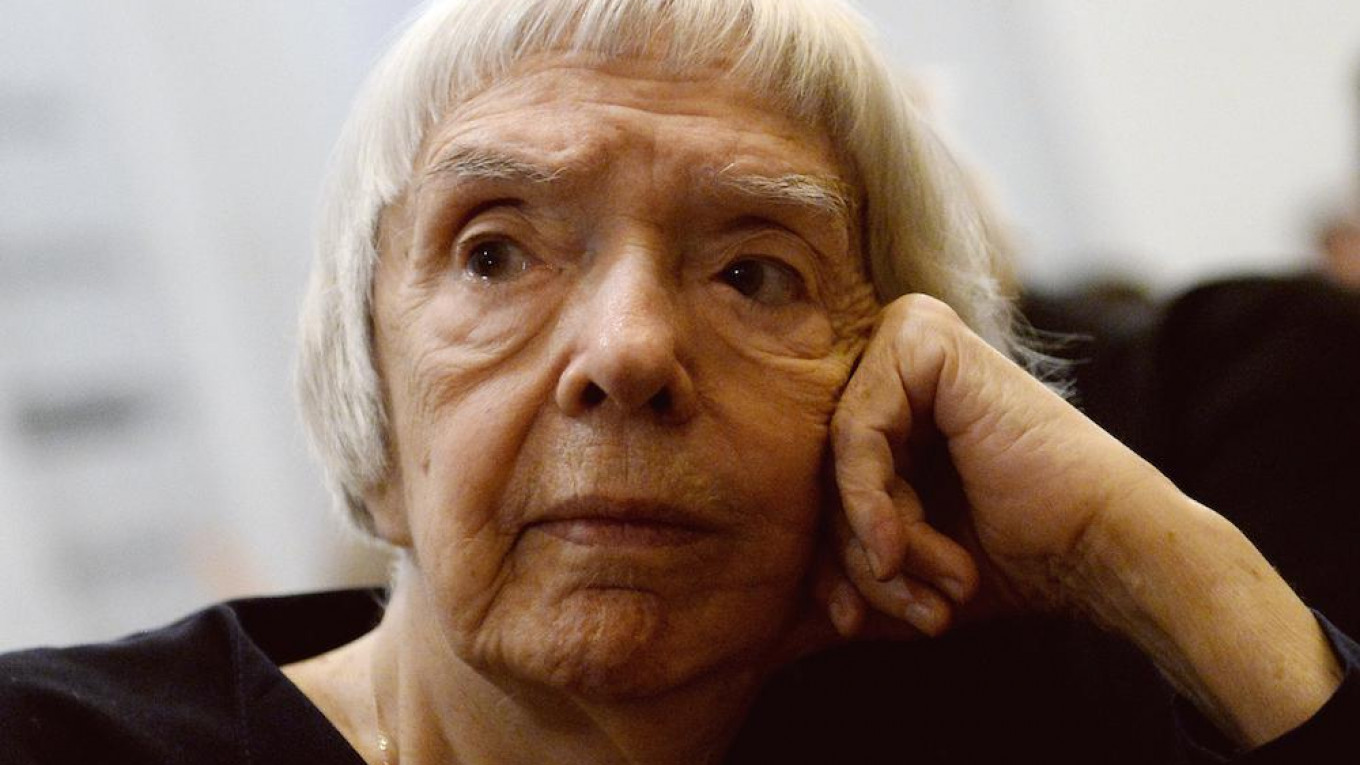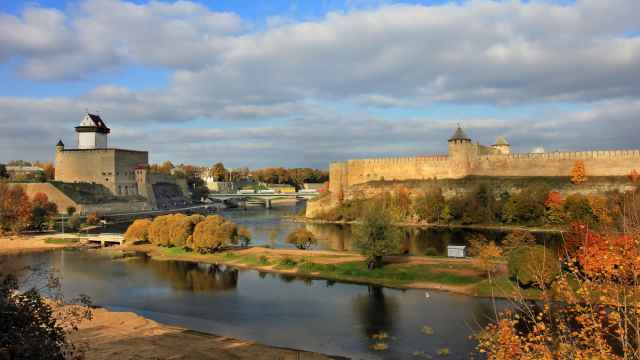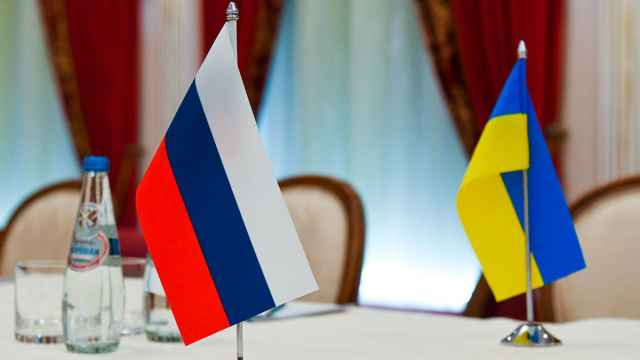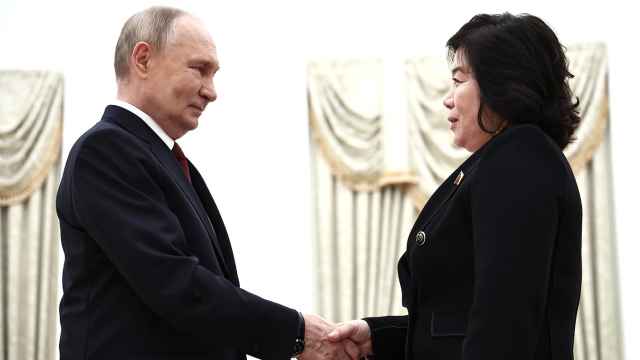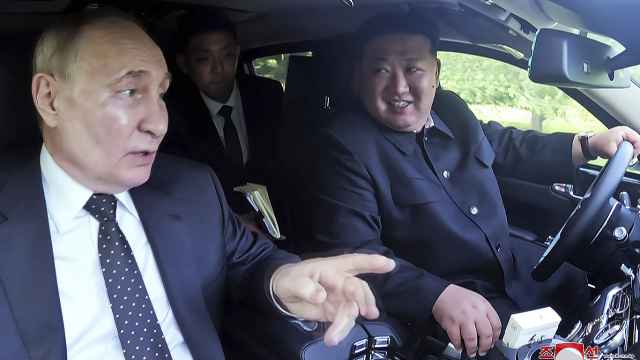Veteran human rights defender Lyudmila Alexeyeva, who was once expelled from the Soviet Union for her dissident activity, turned 90 on Thursday. To mark the occasion, we are republishing an interview Alexeyeva gave to The Moscow Times five years ago, when she turned 85.
In it, she talks about her childhood, the so-called foreign agents law and the status of human rights in today's Russia.
"I don't want to be a foreign agent," Lyudmila Alexeyeva, the veteran human rights campaigner, said during a recent roundtable organized by United Russia heavyweights to promote legislation that would formally label foreign-funded NGOs as "foreign agents" if they participate in "political activities."
The appearance of Alexeyeva was a surprise. But as she walked into the room with the help of an assistant, politicians from all parts of the spectrum looked at her with respect.
"If someone had thought that I wouldn't show up because it was too hot outside, he would have been mistaken," Alexeyeva later told The Moscow Times about the roundtable, to which she was not officially invited.
To maintain the sanctity of her efforts, Alexeyeva recently announced that her Moscow Helsinki Group would work without foreign grants.
An energetic, sharp-minded woman who celebrates her 85th birthday Friday, Alexeyeva is an icon of the country's human rights movement. She returned to Russia in the 1990s after 13 years of emigrant life in the United States.
An archaeologist by training, she dedicated her life to digging up the foundations of the Soviet system, creating the Moscow branch of the Helsinki Group to honor the Conference on Security and Cooperation in Europe's Helsinki Accords on human rights, signed in 1975.
The agreements, which endeavored to force the Soviet government to respect human rights, were signed by Leonid Brezhnev, who saw them as a bargaining chip in relations with the United States and whose government later expelled Alexeyeva from the Soviet Union for her dissident activity.
In an interview, Alexeyeva said that returning to "my Moscow" was her dream while she lived abroad. "I love my motherland. But I can say that we not only have a bad government but also a very bad climate. We are a country that was not created for living a normal life," she said half-jokingly.
In 1993, when the Soviet regime had already been buried for two years, she took the opportunity to return to Russia for good, becoming a strong voice of the human rights movement and a member of the presidential human rights council during the tenure of President Dmitry Medvedev.
She met with The Moscow Times in her apartment on the Arbat, which feels as much like a library as it does a home, thanks to stacks of newspapers and books, including biographies, political works and even a dictionary of youth slang. On the shelf where she keeps photographs of her parents and two sons, Alexeyeva also has a portrait of her friend Anna Politkovskaya, the Novaya Gazeta investigative reporter murdered in 2006.
Q: You now live on the Arbat in an area known as a center of the Russian intelligentsia, though you came to Moscow long ago. What does this mean for you?
A: I live between the house of Pushkin, where he resided with his wife, Natalya Goncharova, and the building where the iconic 1960s poet Bulat Okudzhava lived. My house is right in the middle. My life has turned out in such a way that this is now home to me.
I was born in Crimea, but when I was 3 years old my mother applied to a graduate program at Moscow State University and brought me to Moscow. She sent me to a kindergarten, where I spent five days a week. I do not remember where it was located, but we used to take walks to Alexander's Garden in front of the Kremlin wall.
Then my father came and found a job. He was given two rooms in the Ostankino area where the Cosmos hotel is now located. We lived in a two-story barracks with an old stove as a heater. I remember that I even had rabbits living in a cage nearby.
Later in the 1960s, I often went for walks on the Arbat to see the stores, because there were none in our area.
I remember reading Alexander Herzen books during that time, and as I walked those streets, I dreamed about life during his time: Murano glass carriages carrying fashionably dressed women approaching the houses.
When I returned from exile, I decided that I would live in Moscow and that I wanted to return to this district. I lived in various places, but it is the Arbat and Smolenskaya that symbolize Moscow for me. So when I saw that this apartment was up for sale, my hands began to tremble, because it was exactly what I wanted.
Q: How do you remember the era of World War II?
A: The last time I saw my father was on June 14, 1941. He never returned from the battlefield. He told me before going, "My daughter, I am going to defend Soviet power." He didn't say that he was going to defend his motherland, Moscow or me and my mother. When people bid farewell, they don't lie. He was an honest man, a committed Communist, a person from a poor background.
The war ended on May 9, 1945, and I turned 18 on July 20.
History at that time repeated the events of 1812, when the victorious Russian army went through Europe and saw that people there had normal relationships, while people back home were treated like cattle.
Like the Decembrists of 1825, who were brilliant people and were thinking about freedom and liberation, our veterans came back with similar sentiments. Many of my friends who participated in the war had these thoughts.
In 1937 and 1938, I was about 10 years old, and while I knew that arrests were being carried out, they didn't touch my family. But after the war, I saw the terrible humiliation of very decent people who felt like victors and demanded respect for their victory.
Q: What inspired you to become a human rights campaigner?
A: I think that the foundation was laid during childhood. Everything you teach a child develops automatically later.
My grandmother was an uneducated women who told me a thousand times, "You must live so that you don't do harm to any person, even the worst, because you don't want the same to be done to you."
Recently, I thought about that and said to myself, "I have tried to be like that."
I believe that I probably have a civic-minded temperament. When I went to graduate school, I deliberately chose archaeology because I considered it a field of endeavor where you can lie less. I was interested in Russian history, but in Stalin's time, you had to lie regardless of who you were. I thought that it was simpler in archaeology: You find a pot, you find an ax. But even with that there were a lot of lies.
I have already mentioned the situation after the war, but after I finished university a campaign was being carried out against "cosmopolitanism" that was essentially anti-Semitic.
I'm an ethnic Russian, I was not affected, but it was a very shameful feeling. My friends, girlfriends, respected professors were affected by this campaign.
It was a complete lie, and the authorities thought that intelligent people would believe it!
Back then, there was no term "human rights," but the feelings that I later developed emerged during that time.
Q: Are you disappointed by Medvedev's rule?
A: I was not disappointed because I was not charmed at the beginning. I knew that Putin had put him in place because he understood that the man could be trusted and would give him back his seat. As a person, Medvedev is certainly pleasant. Putin is a KGB-minded guy, whereas Medvedev is an intelligent man and behaves much more nicely. He is not a vengeful person. Despite being so high in the government, he had a distorted view of the world. I remember taking part in his meeting with representatives of human rights organizations from the North Caucasus. I was invited together with Svetlana Ganushkina, another human rights activist, because we were involved in the region. Local human rights activists told Medvedev about the horrors of their life, and they were grateful that the president had invited them. He listened to them all and then said, "I know what you are talking about. I know more than you do. I am just better informed because I have better access to information."
And I thought at that moment, "Dmitry Anatolyevich, because of the fact that you are the president, you receive incorrect information. After all, you do not live the lives of these people."
Q: How would you respond to critics who say the presidential human rights council has accomplished little even though it is composed of respected people?
A: We are an advisory body to the president, but we are not a power structure. We suggest; he listens and decides. Unfortunately, he rarely acted upon our advice, but I've been doing this work since the mid-1960s — almost half a century — and during the Soviet era, the effectiveness of this work usually amounted to zero. This work would bring you nothing but a prison sentence. At that time, our goal was not to press for changes. We knew that we would not be able to achieve that.
As it happened, I was born in this country and under these circumstances. I simply have had to live this life, so I am not ashamed of myself or in front of people whom I respect. And if you have to go to prison for your work, then you go to prison.
My life is coming to an end, and I'm glad that I have lived it this way. I believe that the person who defends his dignity, regardless of the circumstances, is much happier than the person who has everything and behaves like a scoundrel. It is said that the scoundrel has no feelings, but that is not true. He knows that he is a scoundrel.
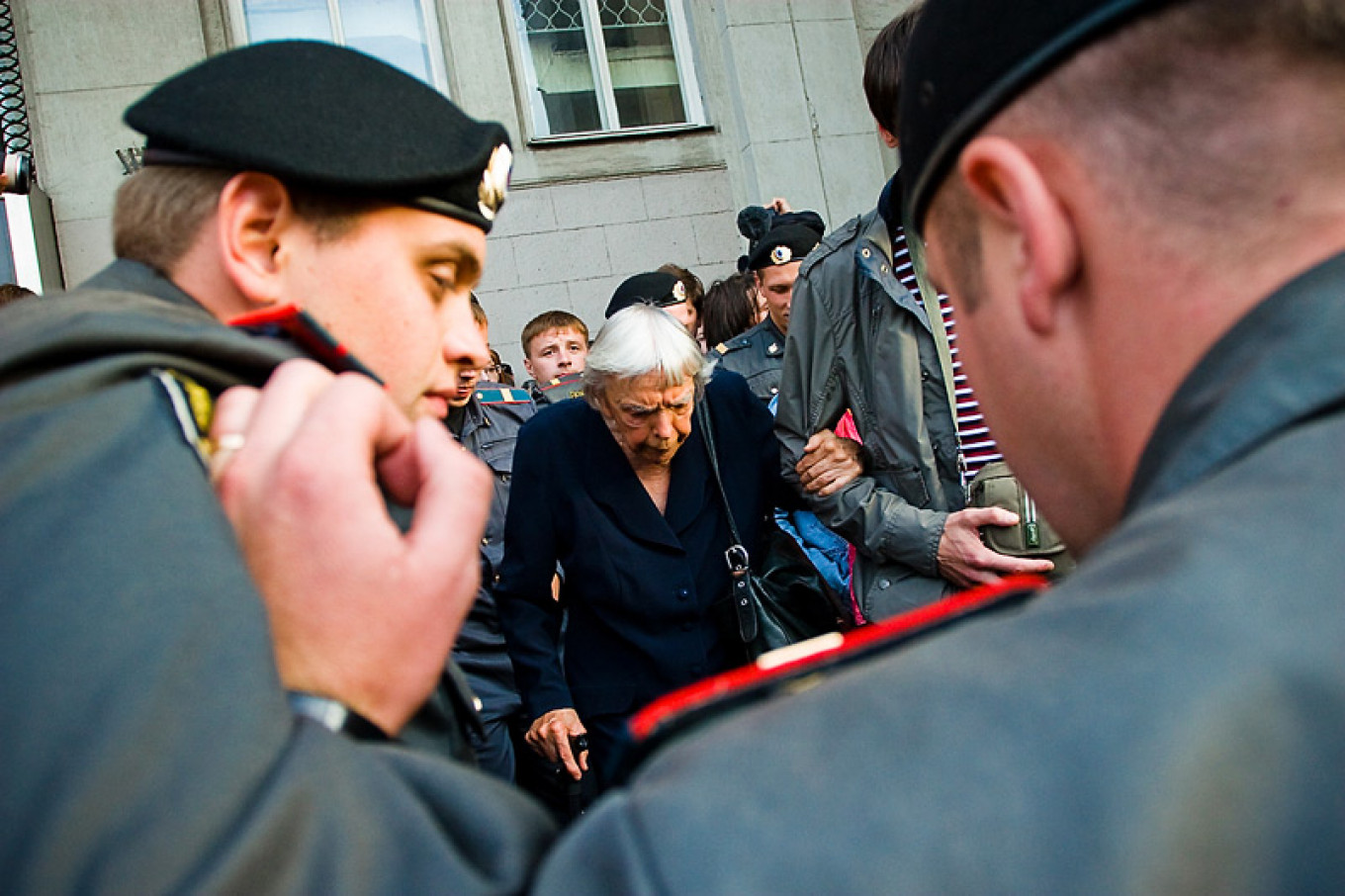
Q: How do you view the situation in which a human rights activist has to defend a person he might not like or respect?
A: I have been very influenced by two people: my close friend Larisa Bogoraz, a prominent Soviet dissident, and Yury Orlov, the founder of the Moscow Helsinki Group. We had a rule that when some activist was released from prison and came to Moscow, we would offer him a place to stay. One man who stopped at my place was a very nasty, creepy and treacherous character. There are those who are sincerely grateful, but he was not like that.
I told Orlov about my feelings, and incidentally, I was right, because this man later wrote a letter denouncing Natan Sharansky, the Soviet dissident who emigrated to Israel and became a respected politician.
But Orlov told me: "Lyuda, nice people are helped by many, but who will help those who are not likable? They are people too." And I remembered that. Today, a lot of people are knocking on my door. If a person has real issues and his rights were violated, I must help him.
Q: Are you afraid that a nondemocratic regime might rise to power if the current government collapses?
A: This issue should be raised by Club December 12, a public group established after the recent large-scale protests in Moscow. I do not feel that serious work is being done on this issue. If we remain unprepared, someone who is better prepared might take power, and we will exchange one problem for another.
But I have the impression that the country is more prepared for democracy and the rule of law today than it was 20 years ago, when we were unprepared.
On my 80th birthday five years ago, I said that it would take 15 to 20 years to achieve democracy. But this is the 21st century, and everything moves very quickly. We do not need to trim the lawn for 300 years like in old Britain, until it becomes ideal. We can move faster.
When I spoke about it back then, it was dark and everything was going in the opposite direction. Now, I have a feeling that something will happen in the next two or three years and there will be abrupt changes within the power system. I think that the current regime will be replaced in two or three years, but it will take time to establish democracy. It will not be a democracy as in England or Germany. It will be like in Romania and Estonia, but still better than the current rule.
Q: What inspires your optimism?
A: I remember that eight years ago I gave a lecture in which for the first time I said that Russia has a civil society. Lev Gudkov, the director of the Levada polling center, dismissed my views at that time. But Levada's surveys were very broad and focused on the masses. Civil society is not the entire population of the country. It is some kind of fiber that is less structured, but it carries an energy that must be identified.
All of those who oppose Putin said that they are against Putin, and those who support Putin said that there is no one to replace him. Why? Because no one else is shown on television.
But is television real life? People across the country want democracy and the rule of law. They just don't know that such ideals are referred to by those terms.
*This interview was first published on July 20, 2012.
A Message from The Moscow Times:
Dear readers,
We are facing unprecedented challenges. Russia's Prosecutor General's Office has designated The Moscow Times as an "undesirable" organization, criminalizing our work and putting our staff at risk of prosecution. This follows our earlier unjust labeling as a "foreign agent."
These actions are direct attempts to silence independent journalism in Russia. The authorities claim our work "discredits the decisions of the Russian leadership." We see things differently: we strive to provide accurate, unbiased reporting on Russia.
We, the journalists of The Moscow Times, refuse to be silenced. But to continue our work, we need your help.
Your support, no matter how small, makes a world of difference. If you can, please support us monthly starting from just $2. It's quick to set up, and every contribution makes a significant impact.
By supporting The Moscow Times, you're defending open, independent journalism in the face of repression. Thank you for standing with us.
Remind me later.


